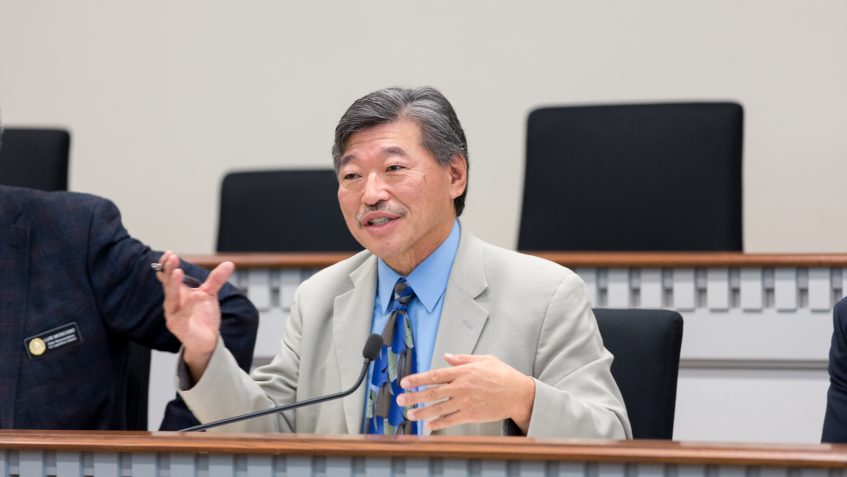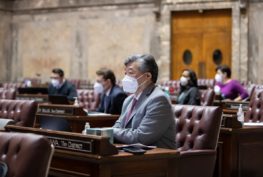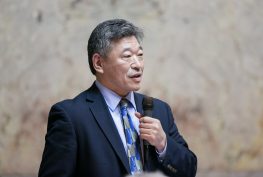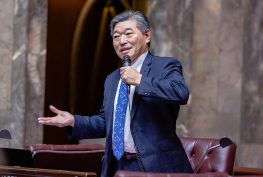OLYMPIA – A joint work session regarding racial and ethnic disparities in Washington’s criminal justice system was held in Olympia on Wednesday, chaired by Sen. Bob Hasegawa, D-Beacon Hill.
“The purpose of these sessions is to shine a light on where racial and ethnic disparities exist in Washington,” Hasegawa said. “While this can be uncomfortable for some to talk about, there are systemic inequalities in our state that must be confronted head-on. The only way to do that is by identifying where and why it occurs.”
The focus of Wednesday’s agenda was the justice system, with an emphasis on juvenile justice, as well as disparities in community and economic development. Future sessions will focus on the educational opportunity gap among other issues. The Legislature is made up of 147 legislators, but only 14 lawmakers identify as people of color. The state population is nearly 30 percent people of color.
The work session was hosted by members of the bicameral Members of Color Caucus, as well as other members of both the Senate and House. Panelists provided testimony regarding bills introduced in 2015 as well as specific points of racial disparity in the justice system and with regards to economic development. In addition, panelists provided ideas and information about how to overcome these disparities.
David Boerner, Chair of the Sentencing Guidelines Commission, pointed out that while Washington has made strides in overall reduction of youth in the system, cutting it in half in the past decade, the number of youth of color in the system in the same timeframe has gone up significantly. Data shows that in 2004, youth of color in the system was at 45 percent; today that number is 58 percent.
Mary Yu, Washington Supreme Court Justice and Co-chair of the Minority and Justice Commission, said one of the chief focuses of the commission is “zero incarceration for juveniles.”
A common theme amongst experts on the panels was the disadvantage of having no formal or centralized process for examining disparity nor aggregation of methods to address it throughout state agencies.
“You can imagine 160 agencies doing 160 different things,” said Chris Liu, Director of Washington State Department of Enterprise Services. “There’s not going to be a concerted effort of how we proceed forth.”
Hasegawa introduced a bill during the 2015 session that would provide racial impact statements to proposed legislation (SB 5752), similar to fiscal impact statements currently generated. The bill did not get to a vote in the Senate.
There was also discussion from several panelists regarding the need for more support through community led initiatives to address disparity through cooperation between local experts within communities of color and government.
Local hiring, one panelist noted, is a critical part of the effort to increase equity in state contracting. In January, the City of Seattle implemented a Priority Hire program to “insource jobs” on public construction projects from within the local communities.
“If you live in that community and can have a livable wage job, then everyone has this benefit.”
To watch the work session, click here.
Panel 1 – Overview (state agencies)
Justice Mary Yu-Wa. St. Supreme Court, Co-chair, Minority and Justice Commission
David Boerner-Chair-Sentencing Guidelines Commission
John Clayton-Asst. Sec’y of DSHS, Juvenile Rehabilitation Administration
Panel 2 – Overview and specific disparities (non-state agencies)
Larry Jefferson-Washington Association of Criminal Defense Lawyers and the Washington Defender Association
Senait Brown-Racial Equity Team, Black Out WA, Ending the Prison Industrial Complex (EPIC) Seattle
Panel 3 – Highlighted Area Expert Testimony
Prof. Alexes Harris-UW Dept. of Sociology, Legal Financial Obligations
Nina Martinez-Latino Civic Alliance, police reporting of police involved fatalities
The second part of the work session will discuss the racial and ethnic disparities in community economic development and include three panels:
Panel 1—Minority Business Entrepreneurs and access to public contracting
Chris Liu-Director, Wa. St. Dept. of Enterprise Services
Frank Lemos-Pres. of WA. Minority Business Advisory Council
Bob Armstead-Pres. National Association of Minority Contractors
Panel 2 – Getting public construction dollars into the community
Lee Newgent-Executive Sec’y, Wa. St. Building and Construction Trades Council, AFL-CIO
Andra Kranzler-Attorney, Puget Sound SAGE and Target Local Hire Coalition
Panel 3—Minority Business Entrepreneurs and access to business opportunities
Ali Raad-Principle, Raad Properties
David Fukuhara-Owner, Concourse Concessions
James Yoo-Owner, Ace Metal Co.
Luz Bazan-Pres., Rural Community Development Resources
The Washington State Legislature Members of Color Caucus are:
Senator Bob Hasegawa (Co-chair), Representative Cindy Ryu (Co-chair), Rep. Mia Gregerson, Sen. Cyrus Habib, Sen. Steve Hobbs, Sen. Pramila Jayapal, Sen. Rosemary McAuliffe, Sen. John McCoy, Rep. Jeff Morris, Rep. Luis Moscoso, Rep. Lilian Ortiz-Self, Rep. Eric Pettigrew, Rep. Sharon Tomiko Santos, and Rep. Brady Walkinshaw



